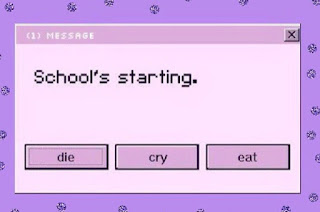Eating Disorders have often been misperceived which has led to multiple repercussions.
They have been ignored, as well as, misdiagnosed. However, a factor common to both is that it has become a "trend" to have some sort of a disorder-now in the limelight-Eating Disorders.
Not only is this wrong, but the reason people endorse in this is because they are unaware of what it actually is. This fad is not good and has to be brought to a full stop;
No Mental Disorders are something to be joked about.
That being said, to prevent further misconception about this topic, let's clear out
What exactly is an "Eating Disorder"?
In simple words, it is a serious mental illness, characterised by eating, exercise and body weight or shape becoming an unhealthy lifestyle of someone's life.
One tries using food to manage their feelings. They tend to have an baleful relationship with food. This may be eating too much or too little food. Maybe eating a lot of food in one sitting. A person can become obsessed with food and their eating patterns becomes detrimental if they have an eating disorder.
Anyone can develop an eating disorder. It doesn’t matter what your age, gender, cultural or racial background is.
There isn't any single primary cause of eating disorders. Several elements are generally at the root of eating disorders, comprising a mix of genetic and psychological factors, problems in the own circle of relatives and/their cultural and social environment. This disorder is consequently often the expression of a deeper malaise which the afflicted individual feels unable to control and strives to control their body weight by way of compensation.
That brings us to the question of the day,
What role does Social Media play?
In simple words, a huge one. All sorts of disorders are fantasized on media those who actually suffer from it are ridiculed.
Today, the popularity and pervasiveness of social networking sites have made these “slender media images” difficult to escape, and the pressures on people to look a certain way seems to have increased drastically.
Emotional and mental health problems like impulsive behaviour , or personality tendencies like perfectionism, self-doubt, or low self-esteem can be underlying causes of food-related disorders. For someone with a real issue, posts about dieting, workouts, or unrealistic body size on social media can easily trigger disordered eating behaviours like excessive exercise or binge eating.
Often on television shows, it has become a "character trait" to show a person suffering from an excessive eating disorder and later loses it after a "glow up". This not only promotes unrealistic body images but also makes the viewers believe that they shouldn't be comfortable in their own body and should try and change it.
These are just a few instances that I've observed on my timeline-I'm sure y'all have too!(drop them in the comments)
Eating Disorders have been highly misunderstood and it's all of jobs to help destabilise it's mockery. They are very real issues that don't just have one type nor just one cure.
Educate yourself, then educate others.
Regardless, if one does feel that they want to change their body, it's only then that they should.
That was it for today! Hope you guys enjoyed the post :) This entire month's theme is going to be based on eating disorders so, stay tuned!
Don't forget to share and drop your views in the comments below!!
Signing off,
Kuhu :)





Comments
Post a Comment